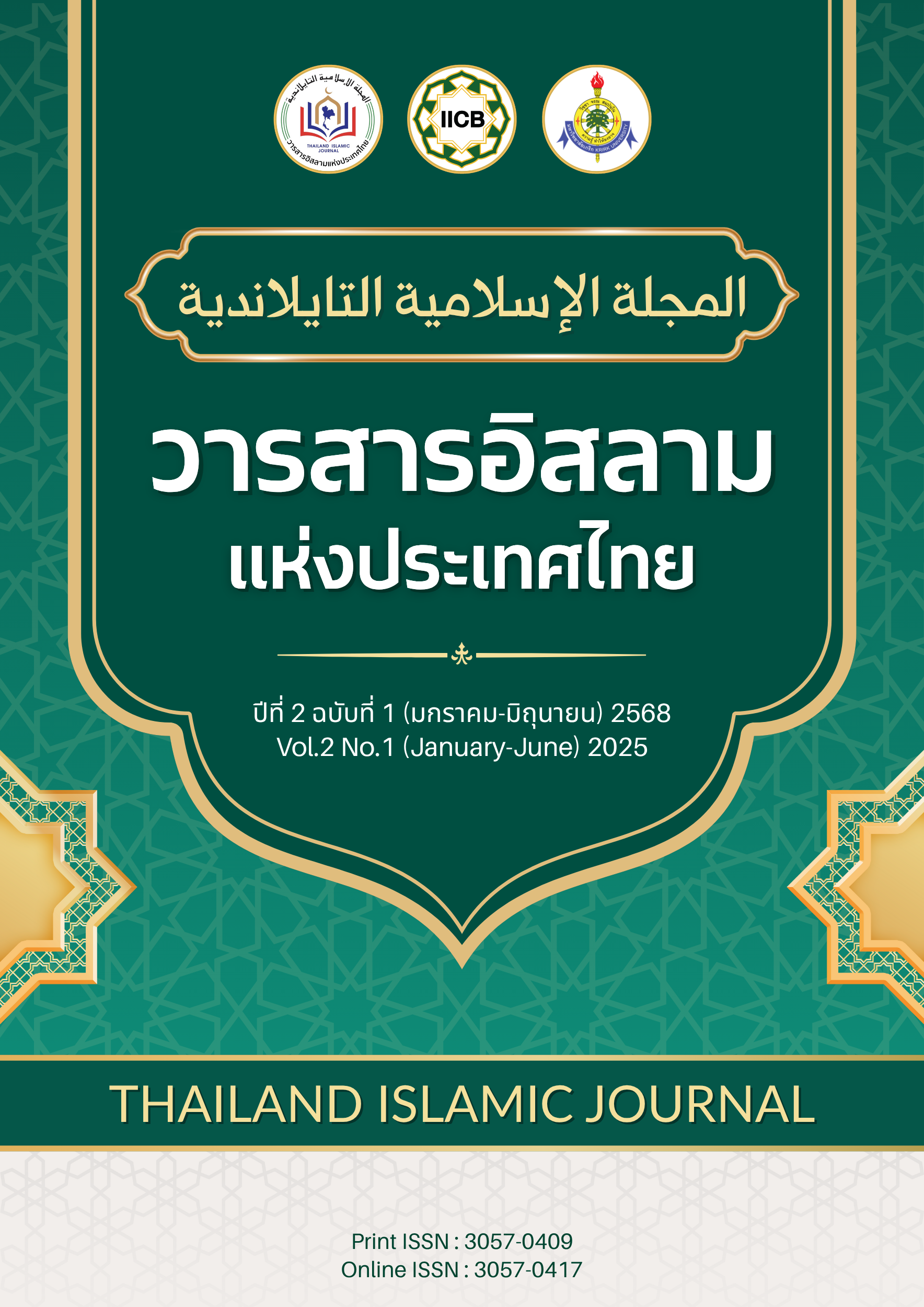รูปแบบการส่งเสริมการท่องเที่ยวที่เป็นมิตรกับมุสลิมในประเทศไทย
คำสำคัญ:
การท่องเที่ยวที่เป็นมิตรกับมุสลิม, การส่งเสริมการท่องเที่ยว, โมเดล HALALบทคัดย่อ
บทคัดย่อ
การท่องเที่ยวที่เป็นมิตรกับมุสลิมนับเป็นแนวโน้มที่เติบโตอย่างรวดเร็วในอุตสาหกรรมการท่องเที่ยวโลก โดยเฉพาะในประเทศไทยซึ่งมีศักยภาพในการรองรับนักท่องเที่ยวมุสลิมจากนานาประเทศ บทความวิชาการนี้ มุ่งวิเคราะห์แนวโน้ม ศักยภาพ และความท้าทายของการพัฒนาการท่องเที่ยวที่เป็นมิตรกับมุสลิมในประเทศไทย โดยใช้วิธีการทบทวนวรรณกรรม (Literature Review) จากแหล่งข้อมูลที่เชื่อถือได้ เพื่อสังเคราะห์เป็นแนวทางเชิงกลยุทธ์ในการส่งเสริมการท่องเที่ยวกลุ่มนี้ ผลการศึกษาได้นำเสนอ HALAL Model ซึ่งเป็นแนวคิดเชิงบูรณาการที่ประกอบด้วยองค์ประกอบหลัก 5 ด้าน ได้แก่ H – Hospitality การบริการที่ให้เกียรติและเข้าใจวัฒนธรรมอิสลาม A – Accessibility การจัดสิ่งอำนวยความสะดวกตามหลักศาสนา L – Lifestyle Compatibility การออกแบบกิจกรรมที่ไม่ขัดต่อหลักศาสนา A – Authentic Halal Food การส่งเสริมอาหารฮาลาลตามมาตรฐานสากล และ L – Learning and Communication การสร้างความเข้าใจและการสื่อสารระหว่างวัฒนธรรม โมเดลนี้เป็นเครื่องมือสำคัญในการพัฒนานโยบายและบริการที่ตอบสนองต่อความต้องการเฉพาะของนักท่องเที่ยวมุสลิมอย่างรอบด้าน และเสริมสร้างศักยภาพของประเทศไทยในฐานะศูนย์กลางการท่องเที่ยวมุสลิมในภูมิภาคเอเชีย
เอกสารอ้างอิง
บรรณานุกรม
Abdrakhmanova, S., & Moghavvemi, S. (2022). Muslim friendly services in Muslim and non-Muslim destinations: Benchmarking. International Journal of Tourism, Culture and Spirituality, 5(2), 1-15. https://doi.org/10.33258/ijotcs.v5i2.793
Abror, A., Patrisia, D., Trinanda, O., Omar, M. W., & Wardi, Y. (2021). Antecedents of word of mouth in Muslim-friendly tourism marketing: The role of religiosity. Journal of Islamic Marketing, 12(4), 882-899. https://doi.org/10.1108/JIMA-04-2019-0078
Aziz, A. H. B. A. (2018). Muslim friendly tourism: Concept, practices and challenges in Malaysia. International Journal of Academic Research in Business and Social Sciences, 8(11), 355–363. https://doi.org/10.6007/IJARBSS/v8-i11/4891
Battour, M., & Ismail, M. N. (2016). Halal tourism: Concepts, practices, challenges and future. Tourism Management Perspectives, 19, 150-154. https://doi.org/10.1016/j.tmp.2015.12.008
Billee, A., Duangsaeng, V., Trakarnsiriwanich, K., & Chaoprayoon, P. (2019). Muslim tourists’ expectations toward Halal tourism in Songkhla Province, Thailand. Asian Administration & Management Review, 2(2), 11-20. https://so01.tci-thaijo.org/index.php/AAMR/article/view/241088
Cetin, G., & Dincer, M. Z. (2016). Muslim friendly tourism (MFT): A discussion. Journal of Tourismology, 2(1), 65-67. https://doi.org/10.26953/jourt.2016.2.1.25
Chookaew, S., Chanin, O., Charatarawat, J., Sriprasert, P., & Nimpaya, S. (2015). Increasing halal tourism potential at Andaman Gulf in Thailand for Muslim country. Journal of Economics, Business and Management, 3(7), 739-741. https://doi.org/10.7763/JOEBM.2015.V3.277
El-Gohary, H. (2016). Halal tourism, is it really Halal? Tourism Management Perspectives, 19, 124-130. https://doi.org/10.1016/j.tmp.2015.12.013
Henderson, J. C. (2016). Halal food, certification and halal tourism: Insights from Malaysia and Singapore. Tourism Management Perspectives, 19, 160-164. https://doi.org/10.1016/j.tmp.2015.12.003
Islamic Tourism Centre. (2022). Malaysia: The global leader in Muslim-friendly tourism. https://itc.gov.my/
Jafari, J., & Scott, N. (2014). Muslim world and its tourisms. Annals of Tourism Research, 44, 1–19. https://doi.org/10.1016/j.annals.2013.08.011
Madlaeh, N., & Chalermmuang, G. (2024). A survey of Muslim tourists' satisfaction with tourism services in Thailand. Journal of Islamic Studies, Prince of Songkla University, 15(1), 23-38. https://so03.tci-thaijo.org/index.php/JOIS/article/view/264627
Mastercard & CrescentRating. (2023). Global Muslim Travel Index 2023. CrescentRating. https://www.crescentrating.com/reports/global-muslim-travel-index-2023.html
Ministry of Tourism and Creative Economy. (2021). Indonesia’s Halal tourism development roadmap. Kemenparekraf.
Muslim, A. K., & Harun, A. (2022). Exploring the concept of Muslim friendly tourism. International Journal of Religious Tourism and Pilgrimage, 10(3), Article 6. https://doi.org/10.21427/8p0a-ax79
Pew Research Center. (2017, April 5). The changing global religious landscape. https://www.pewresearch.org/religion/2017/04/05/the-changing-global-religious-landscape/
Razzaq, S., Hall, C. M., & Prayag, G. (2016). The capacity of New Zealand to accommodate the halal tourism market—Or not. Tourism Management Perspectives, 18, 92–97. https://doi.org/10.1016/j.tmp.2016.05.009
Said, M. F., Adham, K. A., Muhamad, N. S. A., & Sulaiman, S. (2022). Exploring halal tourism in Muslim-minority countries: Muslim travellers’ needs and concerns. Journal of Islamic Marketing, 13(4), 824-842. https://doi.org/10.1108/JIMA-04-2020-0112
Samori, Z., Salleh, N. Z. M., & Khalid, M. M. (2016). Current trends on halal tourism: Cases on selected Asian countries. Tourism Management Perspectives, 19, 131–136. https://doi.org/10.1016/j.tmp.2015.12.002
Shnyrkova, A., & Predvoditeleva, M. (2022). The needs of Muslim hotel customers: Evidence from Russian guests. Journal of Islamic Marketing, 13(1), 133-160. https://doi.org/10.1108/JIMA-09-2020-0294
Sulaiman, Z. A., Iranmanesh, M., Foroughi, B., & Rosly, O. (2022). The impacts of Shariah-compliant hotel attributes on Muslim travellers revisit intention: Religiosity as a moderator. Journal of Islamic Marketing, 13(10), 2108-2125. https://doi.org/10.1108/JIMA-10-2020-0311
Tourism Authority of Thailand. (2021). Halal tourism in Southern Thailand. https://www.tourismthailand.org
World Tourism Organization. (2024). UNWTO world tourism barometer, 22(1). https://doi.org/10.18111/wtobarometereng
ดาวน์โหลด
เผยแพร่แล้ว
รูปแบบการอ้างอิง
ฉบับ
ประเภทบทความ
สัญญาอนุญาต
ลิขสิทธิ์ (c) 2025 Internatinal Islamic College Bangkok, Krik University

อนุญาตภายใต้เงื่อนไข Creative Commons Attribution-NonCommercial-NoDerivatives 4.0 International License.
วารสารที่ได้รับการตีพิมพ์เป็นลิขสิทธ์ของวิทยาลัยนานาชาติอิสลามกรุงเทพ มหาวิทยาลัยเกริก
ข้อความที่ปรากฎในบทความแต่ละเรื่องในวารสารวิชาการเล่มนี้เป็นความคิดเห็นส่วนตัวของผู้เขียนแต่ละท่านไม่เกี่ยวข้องกับวิทยาลัยนานาชาติอิสลามกรุงเทพ และคณาจารย์ท่านอื่น แต่อย่างใด ความรับผิดชอบองค์ประกอบทั้งหมดของบทความแต่ละเรื่องเป็นของผู้เขียน




